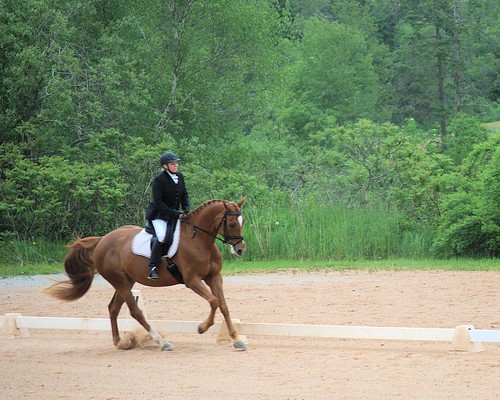German In Horse Riding: Losgelassenheit Posted by Constanze on Mar 21, 2018 in Language
Hello and welcome to another post on untranslatable German words, in which I bring you the quirkiest, most unusual words the German language has to offer – ones which there are often not a direct translation for! Today we are discussing a German word used in English: die Losgelassenheit.
What is die Losgelassenheit?
Die Losgelassenheit is used in English horse-riding terminology to describe a horse who has completely tuned in to their rider, so horse and rider are in sync. The horse has ‘let go’, but in a positive way that means they feel complete trust and confidence in their rider, rather than in a negative way where they have switched off or lost control (I am no expert in horse riding, so if anyone has any better explanation for this, please do let me know!).
What does die Losgelassenheit literally translate to?
This word comes from the verb loslassen, meaning to let go. In this word, it is in the past tense – ‘losgelassen’. The word Losgelassenheit roughly translates to ‘the state of having let go’.
How would you use die Losgleassenheit in a sentence?
In English, people will say things like, ‘How do I know if my horse has achieved Losgelassenheit?’ but it appears mostly to be referenced as a German term, rather than being casually used in sentences. To clarify: it is not used as an English word, like ‘angst’ is, for example, but rather as a German term that is relevant in the absence of a suitable English one.
It is of course used in German. You might describe a horse as ‘ein losgelassenes Pferd’ (‘a horse that has let go’).
What is the nearest English equivalent to die Losgelassenheit?
The fact that it is a German loanword suggests there isn’t an adequate word in English to describe this state. Some suggested translations are ‘suppleness’ and ‘relaxed’. Since I’m no expert in horse-riding I really don’t know if this is the case or not. If anyone has any insights, let us all know!
It is always interesting to see how German words are used in English, and vice versa. If you’d like to read more on the topic of loanwords between German and English, here are some blog posts on the subject:
The English loanword ‘adden’ in German
16 English words that are actually German
Bis bald! – See you soon!

Build vocabulary, practice pronunciation, and more with Transparent Language Online. Available anytime, anywhere, on any device.





